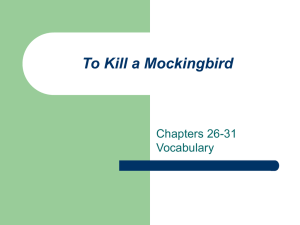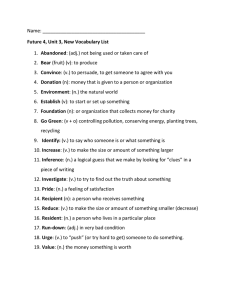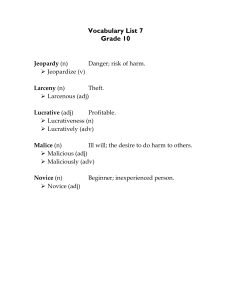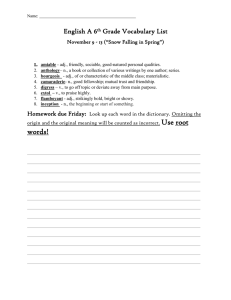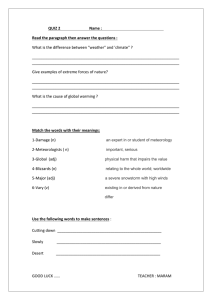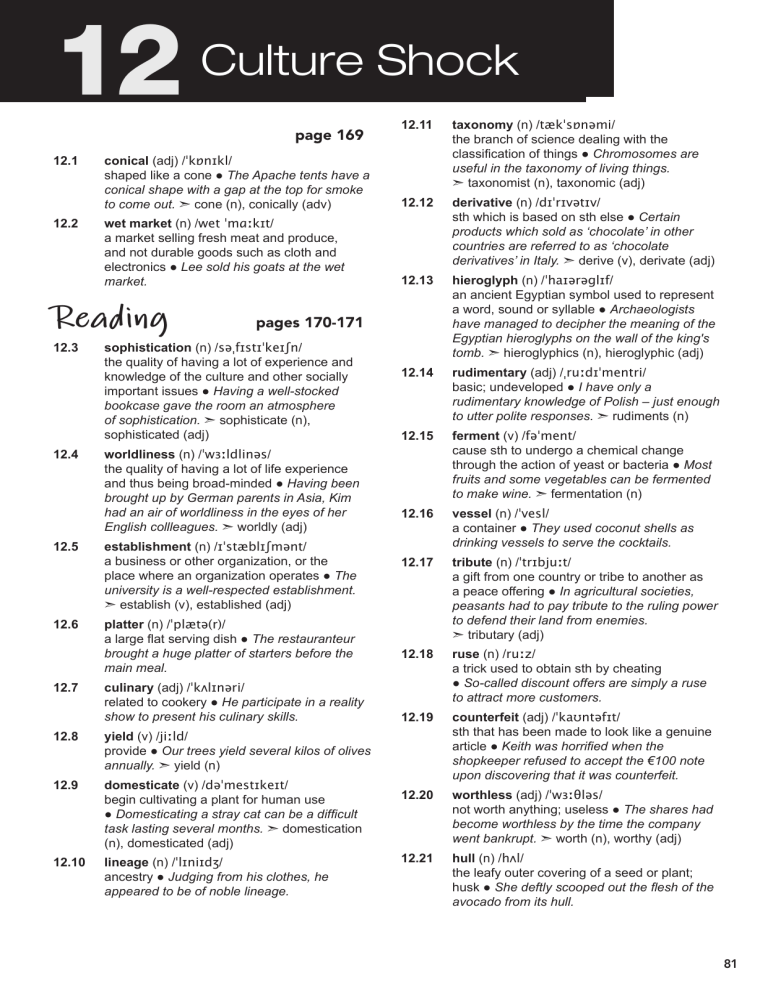
12 12 12.1 12.2 12.11 conical (adj) /ˈkɒnɪkl/ shaped like a cone ● The Apache tents have a conical shape with a gap at the top for smoke to come out. ➣ cone (n), conically (adv) taxonomy (n) /tækˈsɒnəmi/ the branch of science dealing with the classification of things ● Chromosomes are useful in the taxonomy of living things. ➣ taxonomist (n), taxonomic (adj) 12.12 wet market (n) /wet ˈmɑːkɪt/ a market selling fresh meat and produce, and not durable goods such as cloth and electronics ● Lee sold his goats at the wet market. derivative (n) /dɪˈrɪvətɪv/ sth which is based on sth else ● Certain products which sold as ‘chocolate’ in other countries are referred to as ‘chocolate derivatives’ in Italy. ➣ derive (v), derivate (adj) 12.13 hieroglyph (n) /ˈhaɪərəɡlɪf/ an ancient Egyptian symbol used to represent a word, sound or syllable ● Archaeologists have managed to decipher the meaning of the Egyptian hieroglyphs on the wall of the king's tomb. ➣ hieroglyphics (n), hieroglyphic (adj) 12.14 rudimentary (adj) /ˌruːdɪˈmentri/ basic; undeveloped ● I have only a rudimentary knowledge of Polish – just enough to utter polite responses. ➣ rudiments (n) 12.15 ferment (v) /fəˈment/ cause sth to undergo a chemical change through the action of yeast or bacteria ● Most fruits and some vegetables can be fermented to make wine. ➣ fermentation (n) 12.16 vessel (n) /ˈvesl/ a container ● They used coconut shells as drinking vessels to serve the cocktails. 12.17 tribute (n) /ˈtrɪbjuːt/ a gift from one country or tribe to another as a peace offering ● In agricultural societies, peasants had to pay tribute to the ruling power to defend their land from enemies. ➣ tributary (adj) 12.18 ruse (n) /ruːz/ a trick used to obtain sth by cheating ● So-called discount offers are simply a ruse to attract more customers. 12.19 counterfeit (adj) /ˈkaʊntəfɪt/ sth that has been made to look like a genuine article ● Keith was horrified when the shopkeeper refused to accept the €100 note upon discovering that it was counterfeit. 12.20 worthless (adj) /ˈwɜːθləs/ not worth anything; useless ● The shares had become worthless by the time the company went bankrupt. ➣ worth (n), worthy (adj) 12.21 hull (n) /hʌl/ the leafy outer covering of a seed or plant; husk ● She deftly scooped out the flesh of the avocado from its hull. Reading 12.3 12.4 Fast Forward Culture Shock page 169 pages 170-171 sophistication (n) /səˌfɪstɪˈkeɪʃn/ the quality of having a lot of experience and knowledge of the culture and other socially important issues ● Having a well-stocked bookcase gave the room an atmosphere of sophistication. ➣ sophisticate (n), sophisticated (adj) worldliness (n) /ˈwɜːldlinəs/ the quality of having a lot of life experience and thus being broad-minded ● Having been brought up by German parents in Asia, Kim had an air of worldliness in the eyes of her English collleagues. ➣ worldly (adj) 12.5 establishment (n) /ɪˈstæblɪʃmənt/ a business or other organization, or the place where an organization operates ● The university is a well-respected establishment. ➣ establish (v), established (adj) 12.6 platter (n) /ˈplætə(r)/ a large flat serving dish ● The restauranteur brought a huge platter of starters before the main meal. 12.7 culinary (adj) /ˈkʌlɪnəri/ related to cookery ● He participate in a reality show to present his culinary skills. 12.8 yield (v) /jiːld/ provide ● Our trees yield several kilos of olives annually. ➣ yield (n) 12.9 domesticate (v) /dəˈmestɪkeɪt/ begin cultivating a plant for human use ● Domesticating a stray cat can be a difficult task lasting several months. ➣ domestication (n), domesticated (adj) 12.10 lineage (n) /ˈlɪniɪdʒ/ ancestry ● Judging from his clothes, he appeared to be of noble lineage. 81 12.22 12.23 symbolically (adv) /sɪmˈbɒlɪkli/ in a symbolic way; as a symbol ● The statue symbolically represented the nation’s independence. ➣ symbolise (v), symbolism (n), symbolic (adj) etymology (n) /ˌetɪˈmɒlədʒi/ the origin of a word and its meaning ● The history and etymology of many English words dates back to ancient Greek. ➣ etymologist (n) pages 172-173-174 12.31 heritage (n) /ˈherɪtɪdʒ/ a country’s history and long-standing traditions regarded as an integral part of its character ● The Olympic Games are a symbol of Greece’s national heritage. ➣ heritable (adj) 12.32 mannerism (n) /ˈmænərɪz(ə)m/ a subconscious habit or way of behaving ● She has the annoying mannerism of constantly looking at her phone in the middle of a conversation. ➣ manner (n), manners (n), mannered (adj) 12.24 hybrid (n) /ˈhaɪbrɪd/ sth that is produced by a blend of two or more things ● The fruit of the tree was a hybrid of an apple and a pear. ➣ hybrid (adj) 12.25 alkali (n) /ˈælkəlaɪ/ a chemical substance which causes acids to neutralise or effervesce ● As it is an alkali, adding soda to citrus fruit juice will cause it to effervesce. ➣ alkalise (v), alkaline (adj) 12.33 reluctant (adj) /rɪˈlʌktənt/ unwilling; not keen to do sth ● He was reluctant to discuss his wartime experience as it evoked painful memories. ➣ reluctance (n), reluctantly (adv) 12.26 pungent (adj) /ˈpʌndʒənt/ strong smelling or tasting ● The pungent aroma of orange blossoms filled the night air. ➣ pungency (n), pungently (adv) 12.34 age-old (adj) /ˈeɪʤˈəʊld/ sth that has existed for many years; traditional ● The age-old tradition of bullfighting is fast losing its popularity in Spain. 12.27 lavender (n) /ˈlævəndə(r)/ a sweet-scented plant with pale purple flowers ● Before packing away her winter woollies, she leaves small bunches of lavender to keep them fresh and ward off insects. 12.35 quaint (adj) /kweɪnt/ attractive with an old-worldly quality ● The upbeat resort was once a quaint fishing village on the coast of Cornwall. ➣ quaintness (n), quaintly (adv) 12.28 divine (adj) /dɪˈvaɪn/ connected with a god ● It was the divine right of kings to receive tributes from their subjects. ➣ divinity (n), divinely (adv) 12.36 old-time (adj) /ˈəʊldˌtaɪm/ associated with an earlier period ● His greatgrandfather was a banjo player in an old-time music hall. ➣ old-timer (n) 12.29 palatable (adj) /ˈpælətəbl/ with a pleasant taste ● The murky brown soup was, fortunately, much more palatable than it looked; in fact it was quite tasty. ➣ palate (n) 12.37 ever-present (adj) /ˈevə ˈpreznt/ constanty remaining ● Around the souk, the ever-present aroma of spices filled the air. 12.30 fraudulent (adj) /ˈfrɔːdjələnt/ deceptively made to cheat sb, usually to make money ● The company was taken to court for fraudulent advertising. ➣ fraudulence (n), fraud (n), fraudulently (adv) 12.38 long-standing (adj) /lɒŋ ˈstændɪŋ/ that has existed for many years ● It is a long-standing Hawaiian tradition to offer visitors a garland of flowers as a greeting. 12.39 paternal (adj) /pəˈtɜːnl/ from the father’s side of the family ● Nancy’s paternal grandmother comes from Sparta. ➣ paternity (n), paternally (adv) 12.40 nomadic (adj) /nəʊˈmædɪk/ with a lifestyle that involves moving as a group from place to place ● Many Bedouins have now abandoned their nomadic lifestyle in favour of urban life. ➣ nomad (n) 12.41 time-honoured (adj) /taɪm ˈɒnəd/ respected as having existed for many years ● In the time-honoured tradition, the flame was carried all the way from Olympia around the world to the venue of the Games. Food-related words Nouns alkali fare hull hybrid karavai platter 82 Vocabulary salt cellar vessel palatable pungent Adjectives culinary divine intoxicating Verbs ferment Adjectives for traditions age-old ever-present long-standing nomadic 12.49 chronicle (n) /ˈkrɒnɪkl/ a written account of events in chronological order ● Pausanias the traveller’s chronicles have shed much light on the history of ancient Greece up to the 2nd century AD. ➣ chronicle (v), chronicler (n) 12.50 memorial (n) /məˈmɔːriəl/ sth built to remember a famous historic event or figure ● It is customary for people to lay wreaths around the war memorial to honour the victims of war on Remembrance Day. ➣ memorial (adj) 12.51 revival (n) /rɪˈvaɪvl/ the process of regaining strength or sth’s improving prospects ● The tourist industry is beginning to show some signs of revival after years of recession. ➣ revive (v) 12.52 recite (v) /rɪˈsaɪt/ say sth out loud which you have learnt by heart, e.g. a poem or piece of prose ● On 25th January, Scots get together to celebrate the birthday of their national poet, Robert Burns, by reciting some of his best-loved works whilst enjoying traditional food and drinks. ➣ recitation (n), recital (n), recitative (adj) 12.53 oral (adj) /ˈɔːrəl/ spoken ● Angela did very well in the oral exam and turned the whole thing into a natural conversation with the examiner, gaining top marks for speaking fluently. ➣ oral (n), orally (adv) 12.54 vocal (adj) /ˈvəʊkl/ loudly voicing your opinions; generally connected with the voice ● The proposal to do away with the national holiday met with resistance from a vocal majority. ➣ vocal (n), vocally (adv) 12.55 aural (adj) /ˈɔːrəl/ generally connected with hearing ● We did a listening comprehension test to measure our aural skills. ➣ aurally (adv) 12.56 phonetic (adj) /fəˈnetɪk/ using symbols from a special alphabet to denote different sounds; generally connected with sounds ● This book includes phonetic symbols to assist in pronunciation. ➣ phonetics (n), phonetically (adv) old-time quaint time-honoured Things from the past dowry hieroglyph heirloom heritage legacy memorial relic residue the Renaissance vestige 12.42 the Renaissance (n) /ðə rɪˈneɪsns/ the period during the 14th to 16th centuries when art and literature were influenced by a revived interest in classical ancient Greek and Roman culture ● The Renaissance began in Florence with the influx of Greek scholars fleeing the Ottoman conquest. 12.43 dowry (n) /ˈdaʊri/ the custom of giving money or property to a woman or her husband by the woman’s family to support her when she marries ● Until a couple of centuries ago, dowries were still commonly provided to a husband by his bride’s father in western society. 12.44 legacy (n) /ˈleɡəsi/ a situation that is a result of past actions or events ● We are now having to endure the legacy left by the consumerist era of the 80s and 90s. ➣ legacy (adj) 12.45 vestige (n) /ˈvestɪdʒ/ a small trace of sth that has remained over time ● The castle ruins remain as the last vestige of 13th century Frankish rule. ➣ vestigial (adj) 12.46 residue (n) /ˈrezɪdjuː/ a small amount of a substance left after a process is complete ● They were obviously tea drinkers, from the brown residue around the inside of their cups. ➣ residual (adj) 12.47 heirloom (n) /ˈeəluːm/ an object that has been handed down the generations in a family ● This old teapot is a family heirloom which belonged to my greataunt’s mother. ➣ heir (n), heiress (n), heirloom (adj) 12.48 relic (n) /ˈrelɪk/ an object or custom, etc. surviving from the past ● The display case contained pieces of Bronze Age kitchenware and other such relics. Speaking & listening adjectives oral vocal 12.57 aural phonetic deviance (n) /ˈdiːviəns/ an act of doing sth differently from the normal way ● The tribe have retained their old ways and are resistant to any deviance from their social norms. ➣ deviate (v), deviant (n), deviant (adj), deviantly (adv) 83 12.58 primitive (adj) /ˈprɪmətɪv/ simple and unsophisticated ● Some native Australian animals, including the platypus and marsupials, are among the most primitive species in existence. ➣ primitively (adv) 12.59 sit tight (expr) /sɪt taɪt/ stay where you are and wait or don’t move ● The train had just pulled out of the station, so all we could do was sit tight and wait for the next one. 12.60 12.61 12.62 12.63 12.64 esteemed (adj) /ɪˈstiːmd/ highly regarded or respected ● The esteemed professor was our guest speaker at the medical convention. ➣ esteem (n) stay put (expr) /steɪ pʊt/ stay where you are ● Though many of their compatriots had emigrated due to the financial crisis, they decided to stay put and try to weather the storm. integrate (v) /ˈɪntɪɡreɪt/ mix well and become part of a social group ● It takes a couple of generations for foreign incomers to become truly integrated in another culture. ➣ integration (n), integral (adj), integrally (adv) defy (v) /dɪˈfaɪ/ refuse to obey an order; go against a rule ● Oliver did not dare to defy Fagin, for fear of being beaten. ➣ defiance (n), defiant (adj), defiantly (adv) adorn (v) /əˈdɔːn/ decorate ● The temple was adorned with scented flowers and colourful statues. ➣ adornment (n) 12.70 frond (n) /frɒnd/ a long thin leaf ● Through the palm fronds, we could make out a cruise ship on the horizon. 12.71 sane (adj) /seɪn/ logical; of sound mind ● In my view, anyone who takes such foolhardy risks in the name of sport is not entirely sane. ➣ sanity (n) ✎ Opp: insane 12.72 undercurrent (n) /ˈʌndəkʌrənt/ a hidden feeling which has a noticeable effect on sth ● An undercurrent of envy prevented them from developing a closer relationship. 12.73 accomplishment (n) /əˈkʌmplɪʃmənt/ achievement ● The stadium was one of the architects greatest accomplishments. ➣ accomplish (v), accomplished (adj) 12.74 blow your own trumpet (expr) /bləʊ jɔː ʊən ˈtrʌmˌpət/ boast about your success ● Though Steve has never been one to blow his own trumpet, he is rather proud of winning the trophy for Tang Soo Do. 12.75 decipher (v) /dɪˈsaɪfə(r)/ discover the meaning of sth difficult to understand ● He deciphered the enemy’s signal code just in time to help plan a counter attack. ➣ decipherable (adj) 12.76 fondness (n) /ˈfɒndnəs/ affection ● The British fondness for a nice cup of tea is a legacy of their empirical past. ➣ fond (adj), fondly (adv) 12.65 ostracise (v) /ˈɒstrəsaɪz/ exclude sb from a social group and refuse to converse with them ● He was ostracised by the village community for questioning their religious beliefs. ➣ ostracism (n) 12.77 12.66 reverent (adj) /ˈrevərənt/ respectful ● A reverent silence fell as the priest entered the temple. ➣ revere (v), reverence (n), reverently (adv) ✎ Opp: irreverent fit (n) /fɪt/ a short-lasting uncontrollable state of an extreme emotion, e.g. laughter, crying, etc. ● The class burst into fits of laughter at the English teacher’s attempts to speak Greek. 12.78 bout (n) /baʊt/ a short period of sth, especially illness ● A bout of gastric flu caused her to lose quite a bit of weight. 12.67 veil (n) /veɪl/ a covering worn to conceal the face ● The bride wore a traditional lace veil over her face. ➣ veil (v), veiled (adj) 12.68 84 hold fast (expr) /həʊld fæst/ keep believing in sth despite them being questioned or threatened ● Despite a series of setbacks, he held fast to his original business plan until the company eventually took off. 12.69 cremate (v) /krəˈmeɪt/ burn a corpse, usually as part of a funeral ceremony ● As a dying wish, the angler requested that his body was to be cremated and the ashes scattered in the river. ➣ cremation (n), crematorium (n) Expressions blow your own trumpet hold fast sit tight stay put Grammar pages 175-176-177 Speaking page 179 12.79 blight (n) /blaɪt/ a disease that destroys a crop; sth that affects sth/ sb badly ● The blight of fungus destroyed the vines before the grapes had ripened. ➣ blight (v) 12.86 long-winded (adj) /lɒŋ ˈwɪndid/ that goes into a lot of detail and takes too long to get to the point ● Although some of her points were valid, her speech about racial inequality was too long-winded. 12.80 creole (adj) /ˈkriːəʊl/ the language of sb of mixed racial roots, especially in the southern states of the USA and West Indies ● On our visit to the West Indies, we adored the spicy creole cuisine, but could not understand much of the creole language. 12.87 installation (n) /ˌɪnstəˈleɪʃn/ the act of placing sth in a position so that it can be used ● The installation of the new heating system only took a couple of days. ➣ install (v) 12.81 karavai (n) /kəreəˈvaɪ/ a round loaf of traditional Russian bread ● Karavai is a type of decorated bread, traditionally served at Russian weddings to symbolise fertility. 12.88 12.82 salt cellar (n) /sɔlt ˈselə(r)/ a small container which salt is poured ● Could you pass the salt cellar and pepper pot please? This sauce needs a little seasoning. teething problems (n) /ˈtiːðɪŋ ˈprɒbləms/ problems faced in the initial stages of doing sth new ● Opening a restaurant was a good idea, but we faced a number of teething problems before getting off the ground. 12.89 ordinarily (adv) /ˈɔːdnrəli/ usually; normally ● Ordinarily, he never attends religious ceremonies, but he made an exception out of respect to his wife’s family. ➣ ordinary (adj) 12.83 embroidered (adj) /ɪmˈbrɔɪdəd/ decorated with patterns made by stitching with coloured threads ● The woman at the market stall tried to persuade us to buy her embroidered tablecloths. ➣ embroider (v), embroidery (n) 12.90 gem (n) /ʤem/ sth with a uniquely desirable quality ● The peninsula is a hidden gem, with unspoilt beaches and towering cliffs. 12.91 haunt (n) /hɔːnt/ a place that many people visit ● Visiting his old university campus, Dad took me round some of his old haunts in the city. ➣ haunt (v), haunted (adj) 12.92 veritable (adj) /ˈverɪtəbl/ used to emphasise or qualify a metaphor or exaggeration ● The dinner was a veritable disaster; everything went wrong that could go wrong! 12.93 fare (n) /feə(r)/ produce on sale, especially food ● As we passed each stall, we were offered samples of the traditional fare on sale. 12.94 intoxicating (adj) /ɪnˈtɒksɪkeɪtɪŋ/ making you feel excited as though overpowered ● The intoxicating smell of cooking filled the air. ➣ intoxicate (v), intoxication (n) 12.95 unqualified (adj) /ˌʌnˈkwɒlɪfaɪd/ complete ● The fundraiser was an unqualified success. 12.96 gleefully (adv) /ˈɡliːfəli/ happily; in a very pleased way ● She gleefully agreed to prepare the food for the wedding feast. ➣ glee (n), gleeful (adj) 12.84 folklore (n) /ˈfəʊklɔː(r)/ the traditional stories of a country ● There’s usual a moral ending in tales from ancient folklore. Writing Nouns Feelings & Actions accomplishment deviance endurance establishment fit Listening 12.85 fondness installation mannerism ruse sophistication worldliness page 178 indescribable (adj) /ˌɪndɪˈskraɪbəbl/ so unusual that sth cannot be described ● Terrorism in this country caused indescribable suffering to its people. ✎ Opp: describable pages 180-181 85 Video 12: Rite of Passage page 182 12.97 rite of passage (n) /raɪt əv ˈpæsəʤ/ a traditional ritual that symbolises an important stage in sb’s life ● The mother prepared her daughter’s gown for her rite of passage upon her coming of age. 12.98 clay (n) /kleɪ/ a kind of soft mud used in making ceramic dishes ● The potter skilfully moulded the clay into a gorgeous vase, then placed it in the kiln to harden. 12.99 86 endurance (n) /ɪnˈdjʊərəns/ the ability to withstand great difficulty ● The ordeal put the girls through both physical and psychological endurance. ➣ endure (v) 12.100 womanhood (n) /ˈwʊmənhʊd/ the state of being a woman ● The ceremony denoted that the girls had reached womanhood and were ready to find a husband. 12.101 tepee (n) /ˈtiːpiː/ a large conical tent traditional to Native Americans in the past ● Most Native Americans now live in towns or cities and few would contemplate the prospect of a nomadic life in a tepee that their ancestors had. Other nouns blight bout clay derivative etymology gem lavender lineage revival taxonomy tribute undercurrent wet market womanhood
